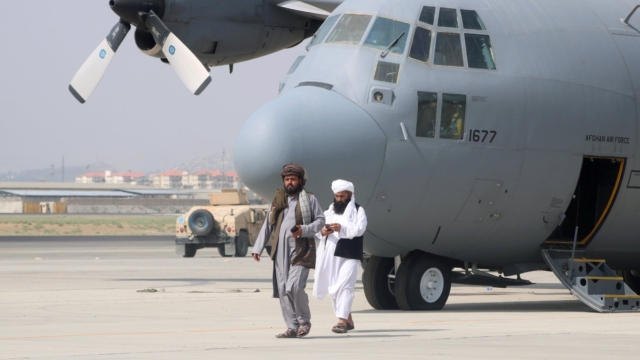
First, remember our troops, living and dead, who served the United States in Afghanistan since 2001. They are owed our gratitude for their steadfast presence in a difficult country and our help as they and their families, and the families of the dead, navigate the emotionally terrible terrain of a defeat inflicted not by the enemy, but by our government’s failure to plan properly for the end of their mission. If it was time for the U.S. to leave, then so be it. But there is nothing the civilians or the military higher-ups can say that will make Americans believe they knew what they were doing. Resignations are in order.
Spare a moment, too, for the 182,071 soldiers in the Afghan Army and Air Force and the 118,628 members of the police and paramilitary security forces serving as of July 2021. Yes, the Afghan force collapsed — but only after the U.S. withdrew its air power and intelligence capabilities, both of which the Afghans had relied upon under our tutelage.
Second, retire the word “privilege” as used in the U.S. to denigrate those perceived to have some inborn, unearned advantage. Whatever your color, race, or sex; whether you are the sixth great-grandchild of slave or fifth great-grandchild of Chinese railroad slaves or the second-generation Vietnamese refugees or the remnants of the Holocaust — if you live in the United States today, you are privileged. You have the advantages of freedom, liberty, and a Constitution. You have access to education, food, medicine, and bathrooms. If you doubt your privilege, watch CNN.
Third, consider the extraordinary arsenal supplied by the United States to our ostensible enemy, the Taliban. Conveniently scattered in U.S. bases around the country, in Kunduz, Mazar-e-Sharif, Herat, Lashkar Gah, Kandahar, Gardez, and Kabul, the U.S. Government Accountability (?!) Office (USGAO) and the special inspector general for Afghan reconstruction (SIGAR) report the following hardware losses:
22,174 Humvees
637 MIII7 vehicles
155 MXX Pro mine-proof vehicles
169 armored personnel carriers
8,000 trucks
42,000 pickup trucks & SUVs
64,363 machine guns162,043 radios
16,035 night vision goggles
358,530 assault rifles
126,295 pistols
176 artillery pieces
33 MI17 helicopters
33 UH-60 Blackhawk helicopters
43 MD-530 helicopters
4 C-130 transport planes
23 Embraer EMB 314/A29 Super Tucano planes
28 Cessna 208s
10 Cessna AC-208 strike aircraft
That leads to a fourth thing. The American withdrawal from Afghanistan was ill-timed, was poorly planned and executed, and will have repercussions with America’s allies and adversaries. The British Parliament, according to The Daily Telegraph, “holds the president in contempt.” Indeed, it did, voting unanimously to condemn both President Joe Biden and British P.M. Boris Johnson for their failures.
This, then, is an opportunity to remind our British friends — and ourselves — that a disastrous military defeat is not necessarily permanent or even precedent-setting.
In 1915, British forces attempted to take the Gallipoli Peninsula from the Turks and the Germans in World War I. “Gallipoli” in England, even today, is a metaphor for disaster. Defeat is defeat is defeat, and Gallipoli ranks as one of the great ones. The British pulled out in November 1915— successfully, actually, surprising their enemies with their sudden disappearance. But they left behind enough kit to stupefy even Gen. Otto Viktor Karl Liman von Sanders, the German commander, who wrote in his memoir, Five Years in Turkey:
The booty at the south group was extraordinary. Wagon parks, automobile parts, mountains of arms, ammunition and entrenching tools were collected … most of the tent camps and barracks had been left standing in part with all their equipment. Many hundreds of horses lay in rows, shot, or poisoned, but quite a number of horses and mules were captured and turned over to the Turkish artillery … the immense booty of war material was used for the Turkish armies. Many shiploads of conserved, flour and wood were removed to Constantinople. What the ragged and insufficiently nourished Turkish soldiers took away, cannot be estimated.
Sound familiar? This is not (only) to dump on the British — among the best of our allies, mistreated by the Biden administration that failed to coordinate with any of the Europeans who have been with us in Afghanistan from the beginning. It is to say that the allies went up from there and won WWI — with our help. Leading to Dunkirk in 1940. Leading to the remarkable manifestation of British will — the evacuation of 338,226 British and French soldiers in part through the efforts of the flotilla of merchant marine, fishing and pleasure craft, lifeboats, and yachts that answered the call. (Google Digital Dunkirk for the 2021 analogy.)
It was after Dunkirk that Winston Churchill said, “We must be very careful not to assign to this deliverance the attributes of a victory. Wars are not won by evacuations.”
The war was won by the determination of allied leaders and their armies — including America’s Greatest Generation — largely supplied by the American home front, full of Americans who knew how important victory was and who were determined to get there.
The open question is whether the United States and its allies have the determination to look the defeat in Kabul in the eye and start to plan for the next, essential battles.





